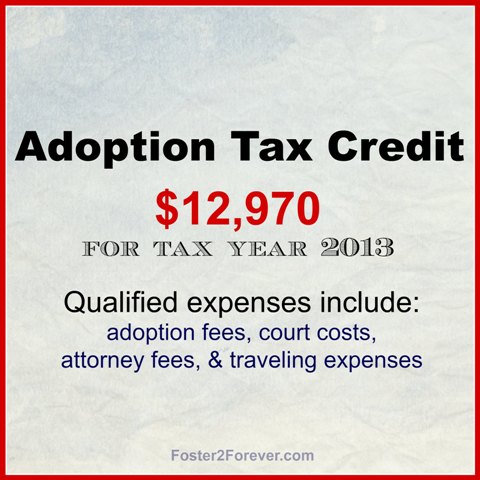If you follow on Facebook, you know that Congress enacted the American Tax Relief Act of 2012 to avoid a “fiscal cliff”. Here is what the text of the actual bill (H.R. 8) says about the IRS adoption tax credit(1):
(A) ADOPTION CREDIT.—
(i) Section 23(b) is amended by striking paragraph (4).
(ii) Section 23(c) is amended by striking paragraphs (1) and (2) and inserting the following:
‘‘(1) IN GENERAL.—If the credit allowable under subsection (a) for any taxable year exceeds the limitation imposed by section 26(a) for such taxable year reduced by the sum of the credits allowable under this subpart (other than this section and sections 25D and 1400C), such excess shall be carried to the succeeding taxable year and added to the credit allowable under subsection (a) for such taxable year.’’.
(iii) Section 23(c) is amended by redesignating paragraph (3) as paragraph (2).
Clear as mud, eh??? {The American Tax Relief Act actually amended the Internal Revenue Code so the numbered references are to IRS Federal tax laws.}
What happened to the adoption tax credit in this 2012 law?
The adoption tax credit was made permanent in the Federal tax laws!!! The adoption tax credit has only been around since 1997 and was reauthorized by a number of bills but now is permanently written into the tax laws. The adoption tax credit was fully refundable in tax years 2010 and 2011; however, it is not anymore.
What does it mean if the adoption tax credit is “refundable”?
Refundable means that you get credit for the entire amount of your adoption expenses, regardless of what you paid in taxes. Since tax year 2012, you can now only get credit for the amount you paid in taxes; however, you do have 5 years to carry over any unused credit from previous years.
How much is the adoption tax credit?
For tax year 2012, the amount is $12, 650 per child for qualified adoption expenses.
For tax year 2013, the amount is $12,970 per child for qualified adoption expenses.
For tax year 2014, the amount is $13,190 per child for qualified adoption expenses.
What are qualified adoption expenses?
Qualified adoption expenses include reasonable and necessary adoption fees, court costs, attorney fees, traveling expenses (including amounts spent for meals and lodging while away from home), and other expenses that are directly related to and the principal purpose of which are for the legal adoption of a child.
How does the adoption tax credit work if we adopted a special needs child?
With the adoption of a U.S. child with special needs, you may be eligible for the maximum amount of credit for the year of you finalize the adoption, even if you paid no qualified adoption expenses.
What is considered special needs?
A child is considered special needs for purposes of the adoption credit if all of the following conditions are met:
- The child was a U.S. citizen or resident when the adoption effort began.
- A state determines that the child cannot or should not be returned to his or her parent’s home, and
- A state determines that the child probably will not be adopted unless assistance is provided to the adoptive family.
Generally, special needs adoptions are the adoptions of children whom the state’s child welfare agency considers difficult to place for adoption, and most foster care adoptions are special needs adoptions, but few other adoptions are considered special needs adoptions.
What IRS Form do we file for the adoption tax credit?
To claim the credit or exclusion, complete Form 8839 (PDF), Qualified Adoption Expenses, and attach the form to your Form 1040 (PDF) or Form 1040NR (PDF).
Disclosure: I am not a tax professional. This information was compiled from the IRS website regarding the adoption tax credit.




